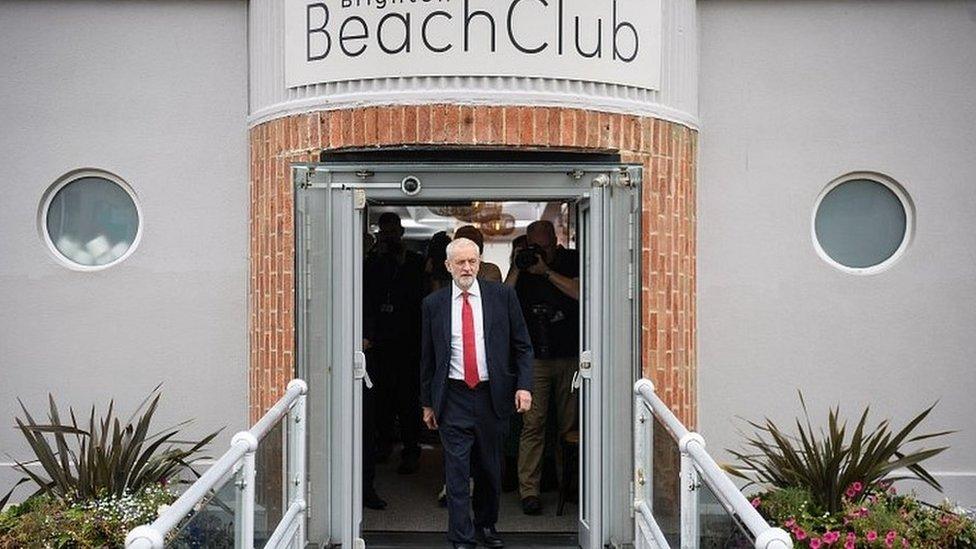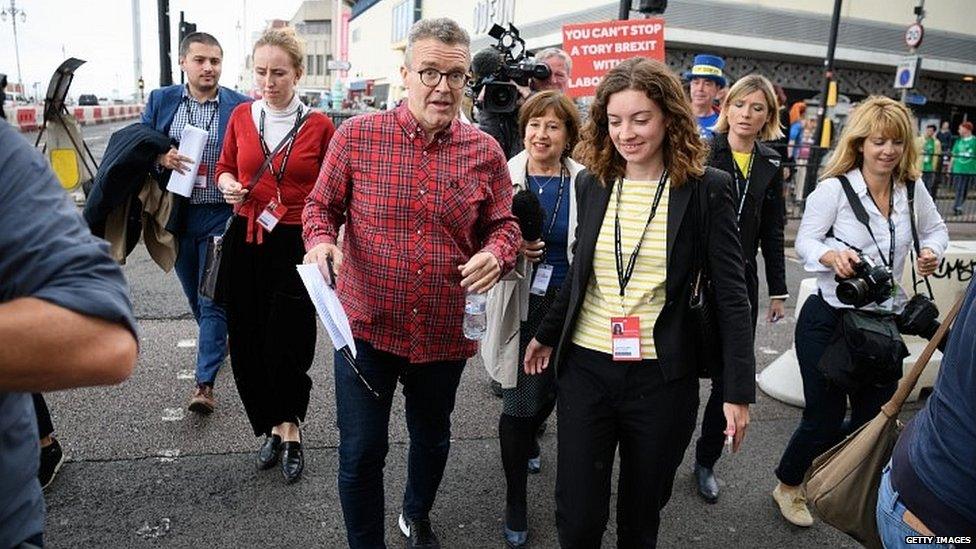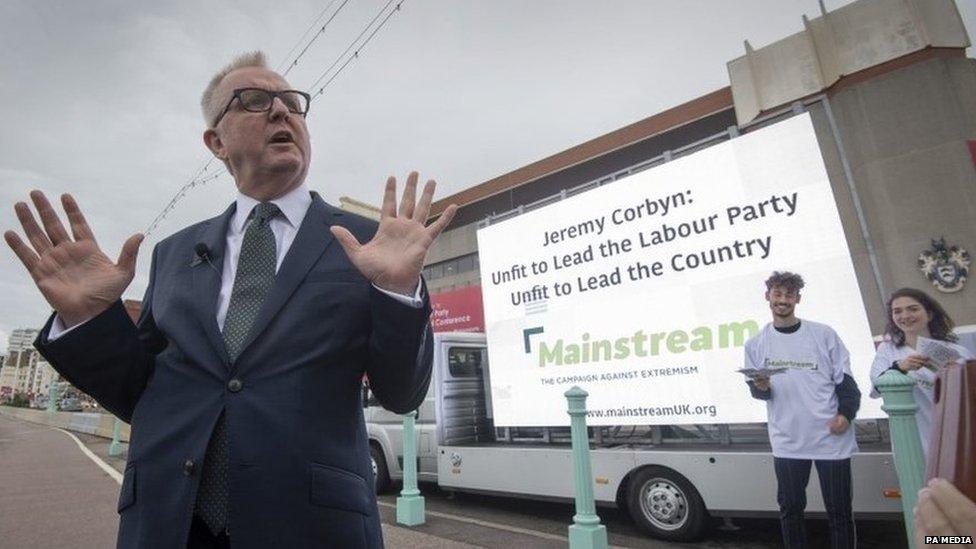Labour: No business as usual as Watson row inflames tensions
- Published

The Labour leader has been fire fighting for the first 24 hours of the conference
"I'm still here and I'll be back next year... hopefully."
Unusual words to hear from a deputy leader of a political party on the first full day of its conference - but these are not normal times for Tom Watson or for Labour.
Inside the conference hall in Brighton, activists have been debating a radical programme of schools reform, which would see the end of Ofsted, free schools and academies and, most controversially, bring about the effective abolition of private schools.
Shadow ministers have been outlining a series of punter-friendly policies, including an end to prescription charges in England, mindful that an election may be eight weeks away.
In media interviews - and during an obligatory tour of exhibition stands in the conference hall - Jeremy Corbyn has been doing his best to play down talk of infighting.
Behind the scenes, though, there is turmoil within the party - and not just over Brexit.
Although an attempt to scrap the post of deputy leader at the start of the conference failed, it has caused deep dismay within much of the Labour movement.
Mr Watson received a hero's welcome during his brief turn at a meeting of Labour First - a caucus for "moderate" members of the party - and for his message that Labour must resist the "destructive, corrosive impulse of factionalism" and be the "partisans of pluralism".
While he attempted to make light of the attempt to remove him with a reference to his recent weight loss, his message was deadly serious.

Tom Watson said Labour members needed to show "moral courage"
"There is a lot of hyperbole at party conference, but I really think there is a battle for the future of the party and you are the leaders of the struggle to save it."
The parliamentary party and the leadership have long been at loggerheads - but there has been a relative truce in recent months as Labour has turned its guns on the new prime minister, Boris Johnson.
But the coup attempt against Mr Watson, which followed a move to disband Labour Students, has ended that and fuelled talk of a fight for control of the party.
'Playing games'
Luke Akehurst, secretary of Labour First, spoke of a "final clash" between the left and social democrat wings of the party waged around who might succeed Mr Corbyn.
And veteran MP Dame Margaret Hodge spoke of a fight to "reclaim the soul, spirit and what has been the absolute essence of the party over the past 120 years".
"Labour is bigger than any of its leaders," she said. "We cannot allow authoritarian populism to defeat democratic socialism."
Rania Ramli, the 21-year-old chair of Labour Students, appealed to people to "stop playing games", saying "it affects people's lives."
As Labour attempts to show it is ready and hungry for power, it seems trapped in the convulsions of its Brexit policy and also surrounded by ghosts of the past.

Ian Austin's appearance outside the conference venue sparked loud arguments
At the Labour First rally, there were warm tributes to several former MPs - including Luciana Berger and Mike Gapes, who jumped ship earlier in the year - even though some have since gone on to join the Liberal Democrats.
"It shows the depth we have plunged to that she is now longer with us," Ruth Smeeth, the MP for Stoke Central and a friend of Ms Berger's said.
And independent MP Ian Austin, who also quit Labour earlier this year, turned up on the seafront to condemn the evils of extremism and anti-Semitism in the party.
His billboard suggesting Mr Corbyn was unfit to lead Labour or the country was parked provocatively opposite the Grand Hotel, at the heart of the conference.
To calls of "why don't you join the Tories?" Mr Austin said Labour had abandoned traditional mainstream values and turned into something "completely different".
'Desperate for change'
But there are many who disagree with him, not least Unite leader Len McCluskey who has called on those who can't show loyalty to Mr Corbyn to quit the shadow cabinet.
Remonstrating with Mr Austin, Islington councillor Sue Lukes said it was he and other "has-been" critics of Mr Corbyn who were out of step with the party.
"I won't stand by and let you slander a good man," she told him.
"What are you doing about the extremism which promotes austerity and denies my residents the rights they need and takes their housing from them and closes hospitals?" she asked.
"We need policies that are going to change the country. The country is absolutely desperate for change and people like you want to break it. So stop it and go away.
"We want a Labour government that will change the country for the better. We want a Labour government that will build houses, schools and hospitals because that is what we need. Anything else is extremism to the people who need it."